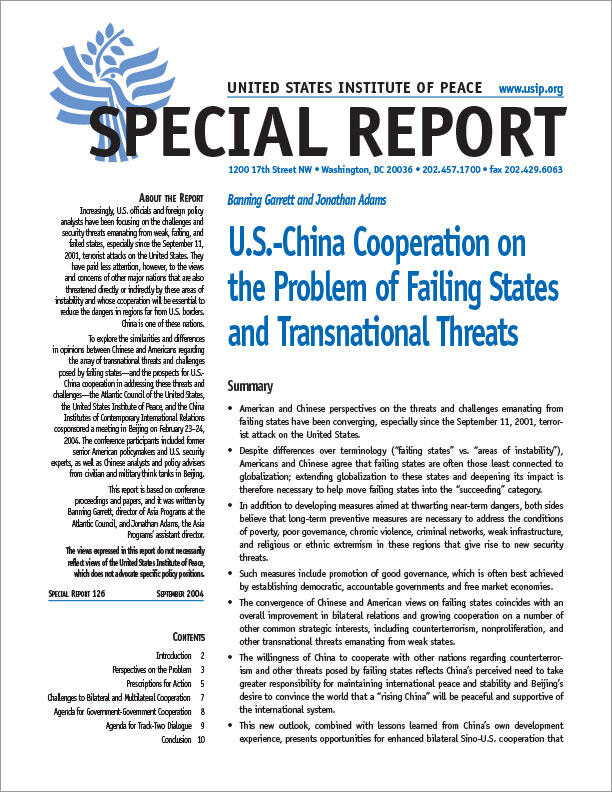U.S.-China Cooperation on the Problem of Failing States and Transnational Threats

Summary
- American and Chinese perspectives on the threats and challenges emanating from failing states have been converging, especially since the September 11, 2001, terrorist attack on the United States.
- Despite differences over terminology ("failing states" vs. "areas of instability"), Americans and Chinese agree that failing states are often those least connected to globalization; extending globalization to these states and deepening its impact is therefore necessary to help move failing states into the "succeeding" category.
- In addition to developing measures aimed at thwarting near-term dangers, both sides believe that long-term preventive measures are necessary to address the conditions of poverty, poor governance, chronic violence, criminal networks, weak infrastructure, and religious or ethnic extremism in these regions that give rise to new security threats.
- Such measures include promotion of good governance, which is often best achieved by establishing democratic, accountable governments and free market economies.
- The convergence of Chinese and American views on failing states coincides with an overall improvement in bilateral relations and growing cooperation on a number of other common strategic interests, including counterterrorism, nonproliferation, and other transnational threats emanating from weak states.
- The willingness of China to cooperate with other nations regarding counterterrorism and other threats posed by failing states reflects China's perceived need to take greater responsibility for maintaining international peace and stability and Beijing's desire to convince the world that a "rising China" will be peaceful and supportive of the international system.
- This new outlook, combined with lessons learned from China's own development experience, presents opportunities for enhanced bilateral Sino-U.S. cooperation that should be explored in the interest of both countries. In addition, the United States and China should work together in multilateral institutions to improve these organizations' responsiveness to the challenges posed by failing states.
- There are some serious potential obstacles to greater U.S.-China cooperation, including strategic mistrust, the volatile Taiwan issue, differences over trade and human rights, and domestic politics in both countries.
About the Report
Increasingly, U.S. officials and foreign policy analysts have been focusing on the challenges and security threats emanating from weak, failing, and failed states, especially since the September 11, 2001, terrorist attacks on the United States. They have paid less attention, however, to the views and concerns of other major nations that are also threatened directly or indirectly by these areas of instability and whose cooperation will be essential to reduce the dangers in regions far from U.S. borders. China is one of these nations.
To explore the similarities and differences in opinions between Chinese and Americans regarding the array of transnational threats and challenges posed by failing states—and the prospects for U.S.-China cooperation in addressing these threats and challenges—the Atlantic Council of the United States, the United States Institute of Peace, and the China Institutes of Contemporary International Relations cosponsored a meeting in Beijing on February 23–24, 2004. The conference participants included former senior American policymakers and U.S. security experts, as well as Chinese analysts and policy advisers from civilian and military think tanks in Beijing.
This report is based on conference proceedings and papers, and it was written by Banning Garrett, director of Asia Programs at the Atlantic Council, and Jonathan Adams, the Asia Programs' assistant director.
The views expressed in this report do not necessarily reflect views of the United States Institute of Peace, which does not advocate specific policy positions.



